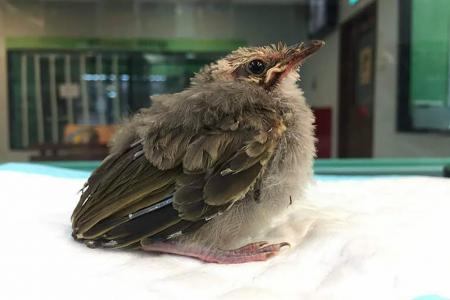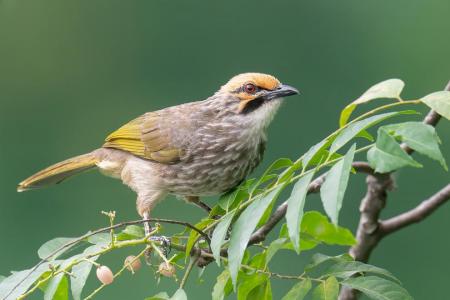National action plan to keep endangered straw-headed bulbuls singing in the wild
There are fewer than 1,700 mature straw-headed bulbuls in the wild worldwide.
A third of this critically endangered bird species live in Singapore, making the island the sole global stronghold for the popular songbird, which is also found in other parts of South-east Asia, including Indonesia, Thailand and Myanmar.
Its rich, melodious and bubbly song makes it popular in the massive trade of caged songbirds in South-east Asia, resulting in the dwindling of its numbers.
To ensure its survival here, a working group has set up a National Species Action Plan to guide conservation efforts for the local bulbul population over the next five years. The team is led by the National Parks Board (NParks) and Nature Society (Singapore), or NSS, and members include the National University of Singapore, Mandai Wildlife Group, Mandai Nature and BirdLife International.
The five-year plan includes population monitoring, and conducting both research and outreach based on the latest scientific evidence.
“While the biggest issue overseas lies in the trapping of the birds for the cage bird trade, our own set of challenges here include trying to improve connectivity between the populations on Pulau Ubin and the mainland,” said senior manager of biodiversity at NParks Low Bing Wen.
The straw-headed bulbul’s three bastions in Singapore are Ubin-Khatib, Kranji-Mandai, and the central forest comprising Bukit Timah and the central catchment nature reserves.
One of the reasons the bird is doing comparatively well in Singapore is that it is no longer trapped here for the songbird trade, unlike in other countries in the region, such as Indonesia. Habitat loss is another key reason impacting the species’ numbers.
Veteran birdwatcher and NSS bird group adviser Alfred Chia added: “In places like Thailand, Myanmar, (the species) is almost extirpated, while in parts of Indonesia, like Java and Sumatra, it is almost extinct, except for the remote parts of Kalimantan.”
Extirpation of a species means it no longer found in a particular area, but not necessarily extinct.

“Captive breeding creates an insurance population in case anything happens to the bird, either in Singapore or elsewhere in the region,” Mr Low said.
“Unfortunately, straw-headed bulbuls are really hard to breed in captivity. The Mandai Wildlife Group is one of the few places in the world that have successfully bred the birds in captivity. Even then, it only successfully raised nine new chicks.”
Mr Chia said wild birds will be fitted with rings on their legs, to enable the tracking of their movement and growth. Genetic monitoring will be done using material such as feathers and excrement.
The straw-headed bulbul is a protected species in Singapore under the Wildlife Act, which prohibits its killing, trapping or offering of sale or import or export.
Get The New Paper on your phone with the free TNP app. Download from the Apple App Store or Google Play Store now


